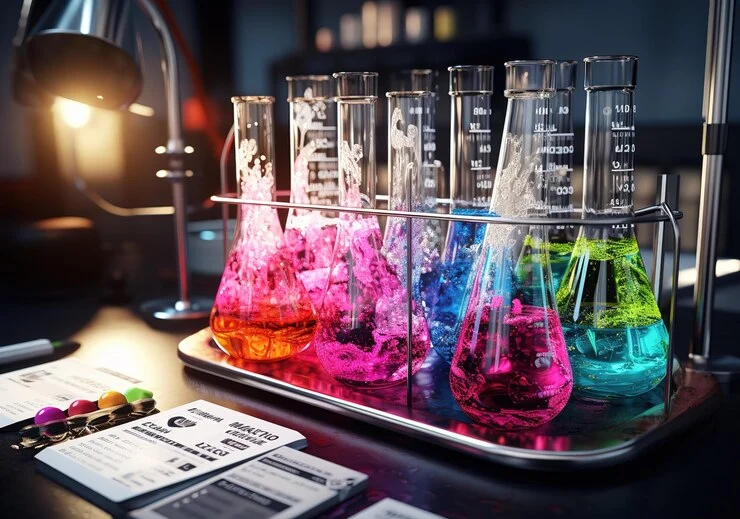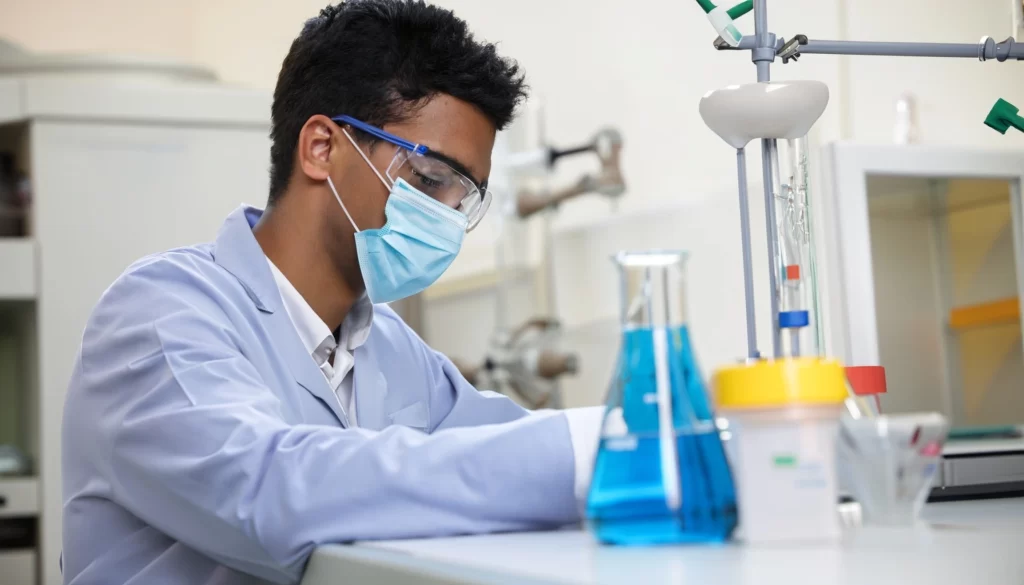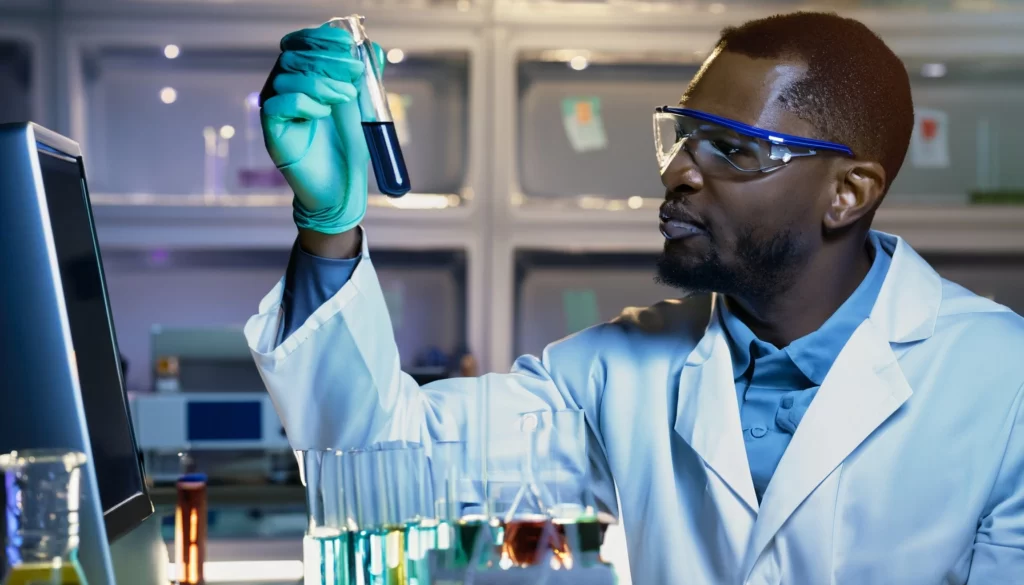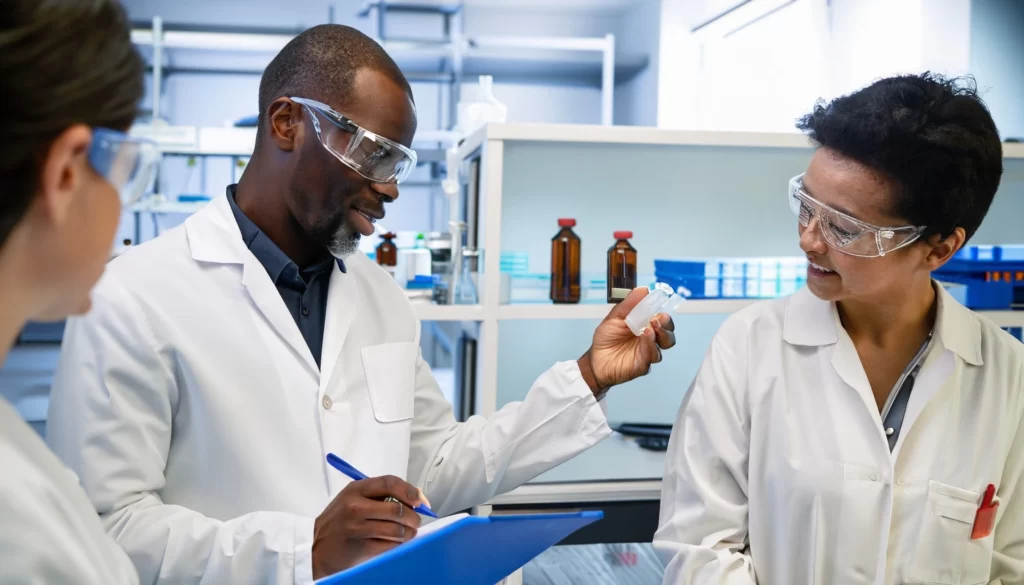Is Analytical Chemistry Hard Or Easy? The Way To Proficiency

In this particular guide on Analytical Chemistry, you will know whether “Is Analytical Chemistry Hard Or Easy?”
We will navigate through the focus areas of Analytical Chemistry, breaking down its challenges and fundamentals and understanding the career options of Analytical Chemistry.
Let’s get started.
Key Takeaway
Key Takeaways
- It is comparatively more accessible than most branches of Chemistry. Still, it can vary depending on individual preferences and strengths.
- Analytical Chemistry emphasizes practical knowledge and precision in analyzing samples.
- It finds applications in various fields, including environmental analysis, forensic science, pharmaceuticals, and more.
- It significantly impacts society by ensuring the safety and quality of products, advancing healthcare through drug testing, etc.
Table of Contents
Is Analytical Chemistry Hard Or Easy?
Analytical Chemistry can be more straightforward for those approaching it with a calculated and systematic mindset. Although a solid theoretical foundation is needed, it primarily calls for practical knowledge.
On the other hand, It can be difficult for students who need help with abstract concepts and theoretical knowledge. Further, the required precision level can be frightening and challenging.
Let’s examine the factors that affect both its difficulty and ease.
1) The Art Of Techniques:
Analytical Chemistry places a strong emphasis on the use of methods and tools to examine samples. The fact that results are obtained by interacting directly with equipment can make it more practical and hands-on.
2) Direct Application:
Analytical methods are often directly applicable to real-world problems. For example, you might use analytical techniques to determine the concentration of a particular substance in a sample, which has clear practical implications.
3) Specific Goals:
Identifying a mixture’s constituents or determining a substance’s concentration are two common objectives in Analytical Chemistry. The tasks may be more straightforward due to the purpose’s clarity.
4) Tangible Results:
Analytical Chemistry frequently yields quantifiable and measurable results. Verifying your analysis’s accuracy is easier because you can measure specific quantities and compare them to recognized standards.
5) Interdisciplinary Nature:
Analytical Chemistry associates in many fields, including science, ecological science, medication, and regions. Subsequently, it is more engaging and pertinent to a more extensive scope of uses.
6) Problem-Solving:
The majority of Analytical Chemistry tasks need the ability to solve problems. Determining the best method to analyze a sample, troubleshoot equipment, or interpret results can be mentally stimulating.
7) The Elegance of Simplified Theory:
In contrast to the complex symphonies of Quantum Mechanics or theoretical Chemistry, theoretical ideas ripple through the tapestry of Analytical Chemistry with elegance.
150+ ![]()
Qualified Tutors
What is Analytical Chemistry?

Analytical Chemistry deals with gathering, modifying, and propagating information about the structure and setup of substances. It is the process of determining the kind and amount of matter, what substances are present, how much of each, and how they are organized.
The Four significant areas of Analytical Chemistry are;
1) Spectroscopy:
Spectroscopy in Analytical Chemistry is a powerful apparatus for concentrating on the structures of molecules and atoms. It involves analyzing how matter interacts with light, allowing scientists to identify chemical components, their concentrations, and molecular arrangements.
By examining the unique patterns of light absorption and emission, spectroscopy unveils valuable insights into the composition and structure of substances.
2) Acid-Base Methods:
The acid-base method is a quantitative analysis method used in Analytical Chemistry. By precisely neutralizing an acid or base with a standardized solution of the other type (an acid or base) with a known concentration, it is possible to determine the concentration of that substance.
This process allows you to accurately measure the unknown concentration based on the volume of the standard solution required for neutralization.
3) Potentiometry:
Potentiometry is a method for calculating the concentrations of solutes in solutions. It measures the difference in voltage between two electrodes, usually a reference electrode and an indicator electrode. The low current flow ensured by this high-impedance measurement permits precise concentration calculations.
It is helpful for many things, like pH measurement and ion-selective electrode tests.
4) Chromatography:
Chromatography is a technique used in Analytical Chemistry to separate mixtures. It distributes components between a stationary phase (immobile) and a mobile phase (moving). As the mobile phase transports the characteristics of the variety through the stationary phase, they interact differently.
This leads to separation based on characteristics like size, charge, or affinity, aiding in precise component analysis.
Applications of Analytical Chemistry:
- Assuring compliance with environmental and other regulations.
- Supporting legal procedures and processes.
- Assuring the safety and quality of food, water, and pharmaceuticals.
- Providing documentation necessary for trade.
- Helping medical professionals diagnose illnesses.
- X-ray analysis.
Focus Areas In Analytical Chemistry:

Some common focus areas in Analytical Chemistry are listed below,
1) Qualitative Analysis:
Analytical Chemistry’s Qualitative Analysis is concerned with locating specific components or collections of characteristics in a sample. By identifying and characterizing the particular features that are present without necessarily quantifying their amounts, it seeks to ascertain the composition.
This procedure aids in identifying the components in a sample, facilitating a thorough analysis.
2) Quantitative Analysis:
In Analytical Chemistry, Quantitative Analysis is a technique that accurately measures a chemical in a sample, always expressed numerically with units. It offers quantitative information on the quantity or concentration of a particular substance.
An acid-base titration is a classic example of quantitative analysis, measuring the exact concentration of an acid or base in a solution.
3) Instrumental Methods/ Analysis:
Study of Instrumental Methods/Anslysis use specialized equipment to carry out analyses. Examples include mass spectrometry, chromatography (HPLC, GC), and spectroscopy (e.g., UV-Vis, IR, NMR).
These techniques support numerous scientific and commercial applications by providing accuracy and sensitivity in identifying and quantifying chemical components.
4) Environmental Analysis:
Using methods to study the environment, Environmental Analysis in Analytical Chemistry mainly focuses on monitoring and analyzing pollutant levels in the atmosphere, rivers, and specific settings.
It aims to evaluate and comprehend the effects of different substances on the environment and human health, helping to protect and manage the environment.
5) Forensic Analysis:
Forensic Analysis uses recently developed field and lab techniques to resolve complex criminal cases. Its primary objective is to collect and Take My Exam for physical evidence, including DNA, drugs, chemicals, and materials, to offer vital details for criminal investigations.
6) Pharmaceutical Analysis:
Pharmaceutical Analysis includes compound identification, determination, quantification, and purification. It is essential for separating ingredients from mixtures and figuring out the structures of compounds.
This field plays a crucial role in the pharmaceutical industry through complete testing and analysis, ensuring medication quality, safety, and efficacy.
7) Food and Beverage Analysis:
Food and Beverage Analysis involves putting products through tests and inspections to ensure their integrity, safety, and quality. It includes numerous methods for determining additives, evaluating nutritional value, detecting contaminants, and maintaining product consistency.
This Analysis is essential for maintaining consumer confidence in the food and beverage sector and regulatory compliance.
8) Material Analysis:
Material Analysis is figuring out a material’s chemical and structural makeup to understand the resulting qualities. This includes researching wettability, catalytic effects, solderability, roughness, color, and other properties, as well as optical and electrical properties.
Ensuring the desired qualities and performance of materials used in goods and processes supports various industries, from manufacturing to electronics.
9) Radiochemical Analysis:
Radiochemical analysis uses the great sensitivity of radioactive radiation detection. Radioactive tracers can label chemical molecules, enabling accurate tracking and quantification.
This method is essential for researching reaction mechanisms and biological processes and tracing compounds in deficient concentrations in various sectors, including environmental monitoring, healthcare, and scientific research.
Different Branches Of Chemistry:
There are several different branches in Chemistry. Some of them are explained below,
1) Physical Chemistry:
Physical Chemistry examines the fundamentals of chemical reactions and transformations. To understand Chemical reactions, Thermodynamics, and Kinetics, it combines Physics and Chemistry to study the behavior of Matter and Energy.
2) Organic Chemistry:
The structure, characteristics, reactions, and synthesis of compounds with a carbon base are studied in Organic Chemistry. It is essential to comprehend how life processes work and is vital for creating drugs, plastics, etc.
3) Inorganic Chemistry:
Inorganic Chemistry studies substances that are non-carbon-based. It contributes to materials science, catalysis, and coordination chemistry by exploring elements and inorganic compounds’ characteristics, structure, and reactions.
4) Biochemistry:
The study of Biochemistry focuses on the chemistry that occurs inside living things. It explores biomolecules like proteins and nucleic acids and their functions in biological processes, enabling advances in biotechnology and medicine.
Challenges In Analytical Chemistry:

Analytical Chemistry education can present its own set of difficulties. Among these challenges are:
1) Complex Concepts:
Understanding intricate ideas about instrumentation, chemical reactions, and data analysis is necessary for Analytical Chemistry. It can be overwhelming to learn about various techniques and their underlying theories.
2) Mathematical Proficiency:
Frequently, Analytical Chemistry necessitates a solid background in mathematics. Some students may need help to grasp ideas like error analysis, calibration curves, and data interpretation.
3) Sample Preparation:
Sample preparation entails taking a representative sample from a larger sample and preparing it for analysis. It ensures the sample is appropriate for the selected analytical method, increasing accuracy and reliability.
4) Data Interpretation:
Analyzing the data obtained through analytical techniques and coming to meaningful conclusions can be challenging. Understanding the methods’ limitations and evaluating possible sources of error are necessary.
5) Variety of Techniques:
Analytical Chemistry includes a variety of techniques, each with its own principles and uses. It can be overwhelming to learn about these techniques and determine which ones work best in which circumstances.
6) Instrument Limitations:
Instruments have limitations in terms of detection limits, selectivity, and interferences. Understanding these limitations is crucial to obtaining reliable results.
7) Chemical Safety:
Working in a lab environment necessitates understanding appropriate safety procedures, including handling dangerous chemicals and using equipment.
Skills To Master In Analytical Chemistry:
There are so many topics in Analytical Chemistry. Still, I will tell you some of the critical skills to master in Analytical Chemistry.
1) Basic Chemistry Concepts:
A strong foundation in General Chemistry is essential. Understand concepts like atomic structure, chemical bonding, stoichiometry, and equilibrium, as these concepts stimulate many analytical techniques and principles.
2) Instrumentation Knowledge:
For accurate results through thorough analysis, Analytical Chemistry requires expertise in various techniques, including spectroscopy, mass spectrometry, electrochemical analysis, thermal analysis, separation analysis, microscopy, and hybrid technologies like GC-MS and HPLC-MS.
3)Sampling and Sample Preparation:
Understand the importance of representative sampling and proper sample preparation techniques. Learn how to handle different types of samples (liquids, solids, gasses) and minimize potential sources of error.
4) Data Analysis and Statistics:
Develop skills in data interpretation, error analysis, and statistical methods. This includes understanding uncertainty, precision, accuracy, and significant figures.
5) Quality Control and Assurance:
Learn about quality control measures to ensure reliable and accurate results. Understand concepts like quality control charts, validation of methods, and traceability.
6) Calibration and Validation:
Master the process of calibrating instruments and validating analytical methods to ensure they meet desired standards and regulations.
7) Analytical Techniques:
Gain expertise in various analytical methods, both traditional and contemporary, to have a broad skill set. This may involve various techniques such as Electrochemistry, Titration, and Spectroscopy.
8) Application Knowledge:
Learn how Analytical Chemistry is used in various fields, including forensic science, environmental monitoring, food analysis, and pharmaceuticals. You will gain a broader understanding of practical applications.
9) Continuous Learning:
Keep up with advancements in analytical techniques and technologies. This field is constantly evolving, so staying informed is crucial.
Fundamentals Of Analytical Chemistry:
The Fundamentals Of Analytical Chemistry bound a range of essential principles and concepts.
Some of them are defined below,
1) Measurement and Units:
Analytical Chemistry is all about precise measurement. Understanding units of measure, conversions, and the importance of accurate measurements is essential.
2) Chemical Equilibria:
Follow the concepts of Chemical Equilibria, such as acid-base, solubility, and complex formation equilibria.
Understanding chemical reactions is crucial for using analytical methods.
3) Analyte and Matrix:
In the fundamentals, the Analyte refers to the specific component in a sample that is interesting for analysis.
The Matrix comprises the remaining substances in the sample, which may not be the primary focus of the analysis.
4) Quantitative vs. Qualitative Analysis:
Qualitative Analysis identifies the presence or absence of specific chemical compounds or elements in a sample.
Quantitative Analysis measures the exact amount or concentration of a particular compound or element in a sample, providing numerical data.
5) Calibration:
Determine the Calibration methods to establish a relationship between instrument response and analyte concentration. This is crucial for quantitative analysis.
6) Errors and Uncertainty:
Understand the systematic (bias) and random (precision) sources of errors in analytical measurements. Know how to estimate and control uncertainty.
7) Standard Operating Procedures:
Learn the significance of adhering to Standard Operating Procedures in the lab, such as the ones for handling samples, functional instruments, and recording data.
Careers In Analytical Chemistry:

There are so many career options for an Analytical Chemist.
Here, I’ll tell you the best career to choose.
1) Food Chemist:
Food Chemists are professionals in improving food and drink products. They research methods like heating, canning, freezing, and packaging to enhance food quality.
They also evaluate how these processes affect qualities like taste, appearance, aroma, freshness, and nutritional content.
2) Forensic Chemist:
Forensic Chemists examine physical materials and samples to find clues in criminal investigations. They use scientific methods when identifying, describing, and interpreting evidence like drugs, chemicals, and fibers.
Their work is essential in giving law enforcement and the justice system scientific insights that help in solving crimes.
3) Cosmetic Chemist:
Cosmetic Chemists create and assess formulas for cosmetics like skincare, makeup, and hair products. They develop and improve outcomes, ensuring high caliber, security, and efficiency. This entails creating new cosmetics, improving existing ones, and providing legal compliance.
4) Agricultural Chemist:
Agricultural Chemists study the biological processes involved in growing food. They examine crops and livestock’s composition, growth, protection, and utilization through chemistry.
Their work helps to improve crop yield, optimize agricultural practices, and guarantee the safety and quality of food production. At the nexus of agriculture and chemistry, it is a crucial field.
5) Metal Alloy Scientist:
Metal Alloy Scientists have made it their profession to study and create metal alloys. They investigate alloy composition, properties, and behavior to produce materials with desired properties like strength, durability, and corrosion resistance.
Their work covers various fields, including aerospace, automotive, and manufacturing, where exact alloy composition control is crucial for product performance.
Lab Experiments Of Analytical Chemistry:
Several important experiments are essential learning tools for aspiring chemists in Analytical Chemistry. These experiments provide an understanding of fundamental ideas and methods, laying the groundwork for comprehending chemical processes.
Let’s explore a selection of these experiments:
1) Acid-Base Titration:
In this experiment, an unknown acid or base solution will be titrated with a standard solution of the opposite type to determine its concentration. For instance, you could titrate a sodium hydroxide solution with a hydrochloric acid.
A color change in an indicator or pH meter indicates the neutralization point.
The idea of equivalence points, titration curves, and the stoichiometry of reactions are all covered in this experiment.
2) UV-Visible Spectroscopy:
UV Visible Spectroscopy determines a sample’s absorption spectrum across the ultraviolet and visible light spectrum. You could examine the absorbance of various colored solutions in this experiment or test Beer’s Law by making solutions with known concentrations and observing the absorbances of those solutions.
You will learn about the fundamentals of electronic transitions and the connection between concentration and absorbance.
3) Paper Chromatography:
Paper Chromatography is a straightforward method for separating and identifying mixture components based on how quickly they move along a paper strip. Students can create visually appealing chromatograms by separating the ink from various pens or the pigment from plant leaves.
This experiment sheds light on phase separation, partitioning, and the function of mobile and stationary phases.
4) Flame Test:
The Flame Test uses the distinctive colors that particular metal ions emit when heated in a flame to determine whether they are present in a sample. By looking at the flame color, it is simple to distinguish between common metal ions like sodium (yellow), potassium (lilac), and copper (green).
Students learn about line spectra and qualitative Analysis through this experiment.
5) Gravimetric Analysis:
In Gravimetric Analysis, the amount of a substance in a sample is estimated based on its mass. Precipitating a known compound from a solution, such as silver chloride, to determine the chloride ions is an illustration of an experiment. The precipitate is filtered, washed, and dried before measuring its mass, which enables the determination of the analyte’s initial concentration.
This experiment teaches stoichiometry and measurement accuracy.
The Impact Of Analytical Chemistry:
Various practical applications have benefited significantly from understanding the fundamental science that Analytical Chemistry has provided.
Such as,
1) Healthcare:
Analytical Chemistry in healthcare assesses medical product performance and safety. It ensures drugs are accurately formulated, medical devices are reliable, and diagnostic tests are precise.
2) Pharmaceuticals:
Analytical Chemistry in the pharmaceutical industry guarantees new medications’ quality, safety, and efficacy. It ensures patients receive effective treatments while reducing risks by verifying drug formulations, purity, and dosage accuracy.
3) Chemical Manufacturing:
Quality control, process improvement, and product consistency are all guaranteed in chemical manufacturing. It examines the quality of finished products, keeps track of chemical reactions, and checks the purity of raw materials.
4) Energy Sector:
Analytical Chemistry in the energy sector ensures effective and environmentally friendly fuel combustion by assessing qualities like octane rating and sulfur content. Analyzing and improving alternative sources like hydrogen and biofuels also helps develop sustainable energy solutions.
5) Academic Research:
Analytical Chemistry significantly impacts academic research because it makes advances possible by providing precise analytical tools. It promotes interdisciplinary cooperation, stimulates innovation, and offers data-driven insights, boosting the credibility of research.
FAQ’s:
1) Which Chemistry is tough?
The “toughness” in Chemistry can shift from one individual to another. Organic Chemistry is frequently considered challenging because of its complicated terminology and perplexing response mechanisms.
2) What Analytical Chemistry is all about?
Classifying, identifying, and quantifying the elements that make up matter are all aspects of Analytical Chemistry. It uses numerous chemical analysis techniques, making it essential for quality assurance, business, and academic research.
3) What are the hard skills of Analytical Chemistry?
Proficiency in instrumentation (such as spectrometry and chromatography), data analysis, statistical methods, sample preparation, and comprehension of chemical principles are just a few examples of the hard skills in Analytical Chemistry.
4) What is the standard addition method in Analytical Chemistry?
Quantitative Analysis is a technique used as a standard addition in Analytical Chemistry.
5) Which is better: Organic or Analytical?
Organic and Analytical Chemistry are chosen based on interests and career goals, But Organic Chemistry offers the maximum job opportunities.
6) Is Analytical Chemistry a good course?
Analytical Chemistry is a good course for those interested in scientific Analysis, quality assurance, or research.
7) What are Analytical and Bioanalytical Chemistry?
Analytical Chemistry deals with general analysis techniques, while Bioanalytical Chemistry analyzes biological molecules.
8) What’s the Salary of an Analytical Chemist?
The median annual wage for Analytical Chemists in the United States is around $79,000, but it can range from $65,000 to over $97,000.
9) How many years does it take to study Analytical Chemistry?
Typically, a bachelor’s degree in Chemistry, which includes Analytical Chemistry courses, takes four years to complete.
10) Is Organic Chemistry Hard?
Analytical and Organic Chemistry both face challenges, with Analytical requiring solid quantitative skills. In contrast, Organic Chemistry needs an understanding of complex reactions, with perceived difficulty varying from person to person.
11) Is Physical Chemistry hard?
Physical Chemistry is a challenging subject, but it is not necessarily the most complex Chemistry course. It is a combination of Chemistry and Physics. The difficulty of Physical Chemistry can vary depending on the student’s background and preparation.
12) Is Inorganic Chemistry hard?
Due to its emphasis on the characteristics and behavior of elements and compounds, Inorganic Chemistry can be tricky. Still, it is manageable with a solid grounding in chemistry theory and practice.
13) Is Quantitative Analysis Chemistry hard?
Quantitative Analysis can be challenging due to its reliance on Mathematical and Statistical methods, but with dedication and practice, it can be mastered.
Conclusion:
I hope you got the Answer to the question: Is Analytical Chemistry Hard Or Easy?
In the comments, let us know how helpful this guide was; also, feel free to contact us.
I am a Natural sciences enthusiast with a profound passion for Biology, Chemistry, Statistics, and Physics. Completed more than 1055+ online classes and exams for the students. So they score high and stress less!
Discount
On Your First Order




